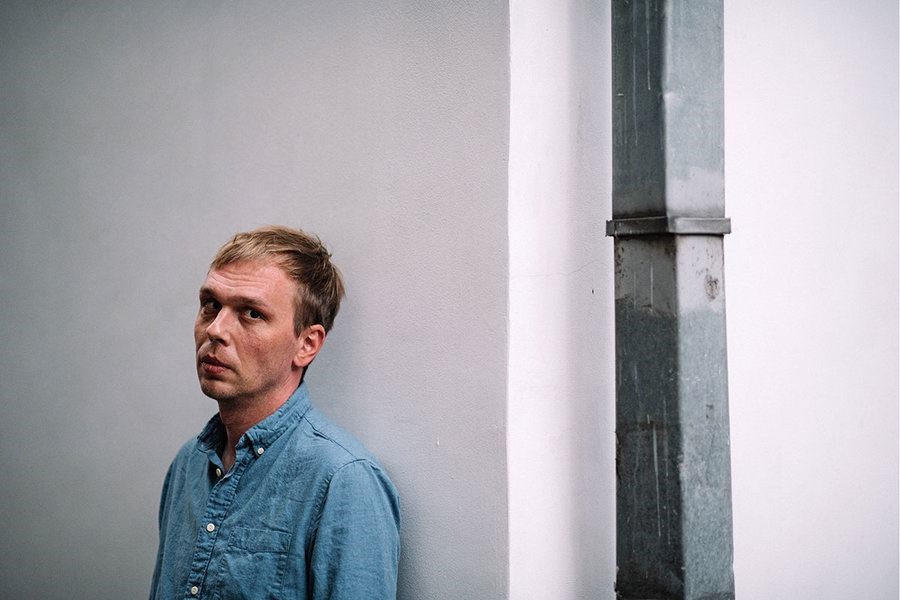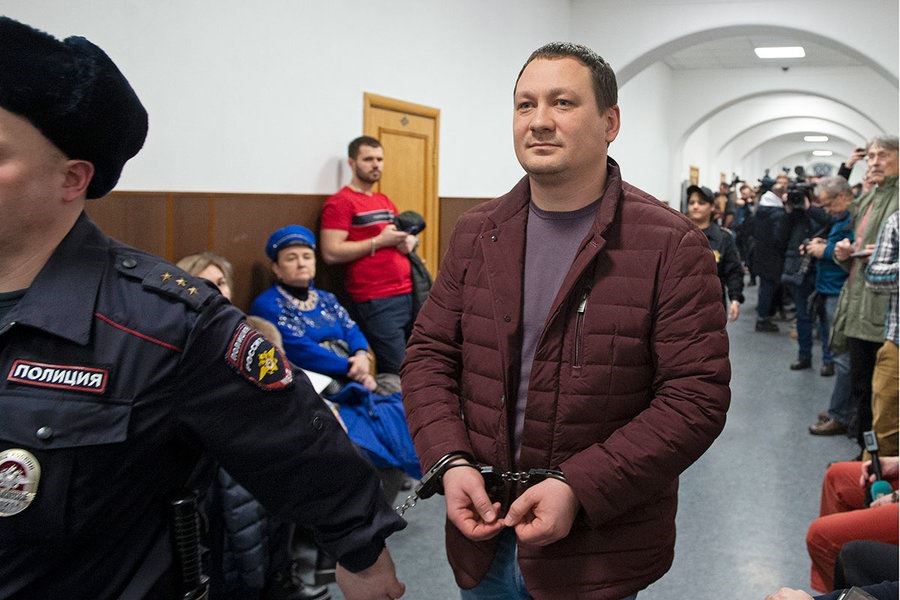Reprinted with permission from The Christian Science Monitor
Russia’s media landscape may be dominated by state-backed outlets, but small, independent journalists are navigating the scene, too, trying to hold authorities to account – and sometimes succeeding.
FEBRUARY 10, 2020 - MOSCOW - Ivan Golunov spent the bulk of his career toiling in obscurity. But now, people often stop him in the street to ask him how he’s holding up, or to engage him on politics.
 Mr. Golunov in Moscow, shortly after being freed from his illegal incarceration last June.Courtesy Ivan Golunov
Mr. Golunov in Moscow, shortly after being freed from his illegal incarceration last June.Courtesy Ivan Golunov
This kind of face recognition is all new for the 30-something investigative journalist, who has worked mostly for critical news outlets on the opposition-leaning fringes of Russia’s media spectrum. But he exploded into the public eye when he was arrested and clumsily framed by Moscow narcotics police last June – and inadvertently created a teachable moment for politically aware Russians and his fellow journalists.
To most Russia observers it looked drearily familiar – an uncompromising reporter being removed by corrupt authorities wielding fake criminal charges. But then something unusual happened. His incarceration was met by a huge and rapid outpouring of popular support for him, including from many of his more mainstream colleagues in the Russian media. Three leading Moscow newspapers ran identical front pages declaring, “We are Ivan Golunov!”
Then the case against him swiftly unraveled, police dropped charges, and within five days he was back on the job, free to publish the article about corruption in the Moscow funeral business that had gotten him into trouble in the first place. Last month, five officers involved in setting Mr. Golunov up were arrested and charged with abuse of power, falsification of evidence, and drug trafficking.
The whole thing shocked him. “I really only learned about the public support for me after I was released,” says a relaxed-looking Mr. Golunov, drinking tea in a central Moscow restaurant recently. “When I was at my court hearing, I heard the commotion outside and wondered what all the shouting was about. But the idea that over a thousand people had come out to protest for me, well that was just amazing. I never imagined the reaction could be that big.”
Galina Arapova, head of a civil society group that works for journalists’ rights in the central Russian city of Voronezh, says that Mr. Golunov’s freedom is something to celebrate in itself. But even more important is the inspiration it has given to Russian journalists, who need to tread the line between truth-telling and irritating the authorities every day, and the expectations of Russia’s fairly sophisticated news-reading public.
 Former Russian police officer Igor Lyakhovets is escorted to a courtroom in Moscow on Jan. 30, 2020. He is one of five former officers facing charges stemming from the June 2019 arrest of Ivan Golunov.Dmitry Serebryakov/AP
Former Russian police officer Igor Lyakhovets is escorted to a courtroom in Moscow on Jan. 30, 2020. He is one of five former officers facing charges stemming from the June 2019 arrest of Ivan Golunov.Dmitry Serebryakov/AP
“I think Ivan’s case has stirred up the journalist community, which has been gradually maturing” over many years, Ms. Arapova says. “The basic lesson here is that every journalist needs to work with the secure knowledge that he or she can depend on the solidarity of colleagues in a moment of trouble. This is essential for all journalists who want to do their jobs honestly.”
Mr. Golunov is a child of Russia’s turbulent 1990s when Russian society imploded, old value systems were utterly discredited, and almost everyone was struggling to reinvent himself. His parents, Moscow professionals, kept changing his school. At one point he found himself in one of the new experimental schools that cropped up amid the post-Soviet wasteland, where teachers encouraged him to concentrate on self-development.
That’s how he discovered journalism, he says, at the age of 13. He went to work for a local free paper aimed at youth where, in the wake of Russia’s devastating 1998 financial crisis, he wrote about counterculture, educational affairs, and other news from his own district. Later he joined a municipal paper put out by local authorities, where he covered the news from the point of view of his bosses.
“I was happily writing about successes, how great our local authorities were,” he says. “I believe my last story for them was something about how, by the efforts of our local authorities, a war veteran had his bathroom replaced. That was the sort of thing I did.”
He gradually became interested in issues that fell a bit outside the box, such as the rights of disabled people and the dismal level of Moscow’s public accessibility for them. He wrote a piece about that and took it to the opposition newspaper, Novaya Gazeta, which is partly owned by former Soviet leader Mikhail Gorbachev. They gave him a full-time job. “Novaya Gazeta always took in young people and gave them a chance to work and learn,” he says.
His first introduction to investigative journalism came when he was given the job of checking official military casualty statistics from the then-raging Second Chechen War against the actual number of coffins being recorded in Russia’s far-flung regions by the Committees of Soldiers’ Mothers, a grassroots anti-military group. He found massive discrepancies.
“We compiled lists based on what the Soldiers’ Mothers committees around the country told us, and published them alongside the official statistics,” he says. “That created quite a stir. The Ministry of Defense, which had been releasing figures just once a month, began publishing them every three days. And they were much more accurate. We realized that our efforts had made the difference and forced them to react, to provide better information.
“I was just 16 then. And at this moment I understood the importance of the job I was doing,” Mr. Golunov says. Military prosecutors would call to exchange information, and he was sometimes summoned to court to provide evidence in war-related cases. “I was not just informing my readers; I was also informing the authorities of things that were going on, and that was leading to changes.”
Mr. Golunov went on to work for a string of critical news outlets, including Gazeta, the TV station Dozhd, Russian Forbes, RBK, and the online magazine Slon.ru. In some cases he was forced to leave by ownership changes that narrowed the scope for independent reporting. At other times he moved on driven by his own restlessness. About three years ago he found a home with the Latvia-based news agency Meduza, which he says encouraged him to do the stories he felt were most needed.
That’s the short version of how he found himself one day last June shoved up against a wall, handcuffed by Moscow narcotics police outside a cafe where he had gone to meet a source, and shouting to passersby to please phone his editor as he was bundled into a police van. After more than six months of freedom and newfound fame, he is still deeply dissatisfied.
“I know there is a struggle within the system,” he says. “I know there are good cops who only want to do their jobs properly, because I have met them. But they aren’t making the difference. This thing happened to me. It attracted public attention, it caused a big commotion, but to this day no one is punished. People tell me they don’t believe that top-ranking officials will ever be punished for abusing their power. That’s bad. I want to live in a country where people have confidence that perpetrators will be brought to justice.
“Many people I know say they see no point in going into the streets to protest. I tell them that there can be results. I want people to believe in the possibility of change, and the value of taking personal action.”
Kirill Martynov, the political editor of Novaya Gazeta, says that Mr. Golunov’s case was almost unprecedented, and its outcome was a clarion call for everyone who wants to push the envelope of freedom in Russia’s tightly managed political system, whose leaders are nevertheless sensitive to public pressure.
“The case of Golunov shows that if people shout loudly enough, there are people at the top who are willing to listen,” says Mr. Martynov. “This is an important lesson for everyone who wants to live in Russia over the next few years. There are lots of reasons to shout and to demand dialogue with the authorities.”
As for Mr. Golunov, he is planning to start a school for investigative journalists and take it on the road, to educate a new generation in Russia’s diverse regions.
“I have found that many journalists out there have never learned to work methodically, to use sources and databases as their basic tools,” Mr. Golunov says. “I’ve talked to a lot of people about setting up classes to teach journalists to improve their game. I get positive responses from state journalists as well as independent ones. I hope we’ll start this project up in the spring. I’m really enthused about this idea.”
Page created on 2/11/2020 3:48:39 AM
Last edited 2/11/2020 3:56:53 AM
